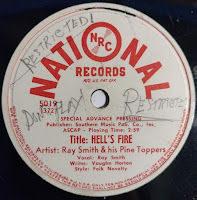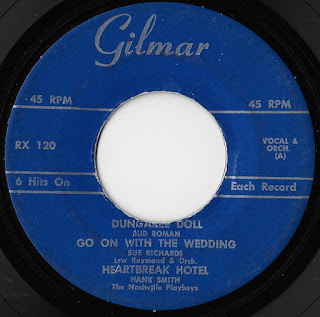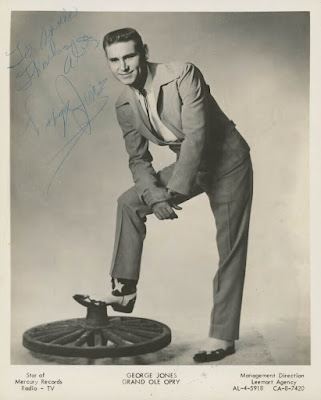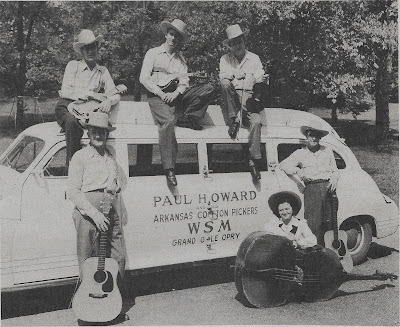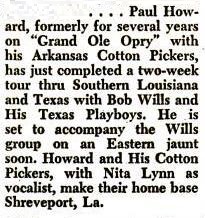Although Ray Smith was a household name in New England's country music scene in the 1950s, he is pretty unknown nowadays. He is not to be confused with other artists of the same name, including "Rockin'" Ray Smith of Sun Records fame or rockabilly singer David Ray Smith.
Smith was born on June 25, 1918, in Glendale, California, a city near Los Angeles. Country music was not very popular in this region at that time, that wouldn't change until the 1930s. Though, Smith took up the guitar when he was eight years old and music became his passion. Smith's father wanted his son to study law but by then, country music's popularity grew and Smith tried his luck as a professional performer.
Smith joined a rodeo show that criss-crossed the country and it was through this show that he gained his first experiences as an entertainer. It is my assumption that Smith served during World War II but details on this issue escape me, unfortunately.
By summer 1945, Smith had made his way to New York City, where he began singing on WMCA. He also became part of a trio that played the local night clubs and was busy performing all around the city as well as the country music park circuit in Pennsylvania. That trio could have been Vaughn Horton's Pinetoppers, a band with which Smith made his first recordings, or the Rocky Mountain Rangers, another band that Smith was performing with. Vaughn Horton was a country music performer, songwriter, as well as a record producer and had connections in New York's urban country music scene. In February 1947, the Pinetoppers - including Ray Smith - recorded two sides that found release on Continental Records ("The Leaf of Love" b/w "So Round, So Firm, So Fully Packed", #8019). Although Smith went on to record solo for different labels throughout the years, he remained associated with the Pinetoppers.
 |
| Billboard May 22, 1948 |
It was in New York City that a talent scout discovered Smith and in the end, he signed a recording deal with major Columbia Records. His first session for the label took place on April 1, 1949, in New York City. From the songs recorded that day, the label released "Waltz of the Alamo" b/w "Rainbow" in May 1949 (#20583). Another session followed the same year and a third one in 1950.
One of Smith's disc was the Christmas season single "Jolly Old Saint Nicholas", a traditional arranged by Vaughn Horton and one of the earliest recorded versions, as well as another Horton song that became a classic, "An Old Christmas Card" (Columbia #20604, 1949). "Jolly Old Saint Nicholas" was also issued in Great Britain and Australia. Smith's "Daddy's Little Girl" (#20670) was one of the DJs' top picks, reported by Billboard in March 1950, and showed promising sales. Though, it didn't reach the charts. Seven singles were released by Columbia in total and though it was reported by publications that Smith was a good-selling artist, Columbia saw no need to renew his contract.
In late 1950, Billboard reported that Smith had switched from Columbia to London Records. Most of his recordings for the label were released as by "Hank Dalton", a pseudonym the label also applied to Wayne Raney. Another seven singles were produced for London but chart success eluded Smith again.
Probably his biggest success came with the Pinetoppers. While he had recorded solo during the years 1947-1950, he recorded during 1951 as part of this group, which produced one chart hit. Their "Lonely Little Robin", paired with "Hometown Jubilee" on Coral #9-60508, became a #11 C&W hit and a #14 pop hit. Possibly due to this success, Smith began recording solo for Coral and three discs appeared, including a cover of "Lonesome Truck Driver's Blues" (which is considered to be the first trucking song in country music).
 |
| November 11, 1950 |
In 1953, Smith joined the cast of WCOP's Hayloft Jamboree, a live stage show that toured the greater Boston region. This show also included other well-known names such as Eddie Zack, Rosalie Allen, Kenny Roberts (who also worked with the Pinetoppers), and the Bayou Boys (including Buzz Busby and "Cowboy" Jack Clement). Some of his last recordings were made during these years. In 1954, Smith cut two numbers with Vaughn Horton's band for the small Bridge label, "The Angel with the Golden Hair" b/w "Kur-Ink-A Tink-A Chink-A" (#18001).
Around early 1955, Smith left the music scene and would not perform until early 1957. He then teamed up with fellow singer Eddy Smith, performing around Garfield, New Jersey. Probably his last session was recorded in 1967 with the Pinetoppers for the Peer-Southern label. Ray Smith passed away on December 4, 1979.
Despite his moderate success as a performer and recording artist, Smith is largely forgotten today. German Cattle Records released a CD with many of Smith's National, Columbia, and London recordings. In 2010, another CD appeared that contained previously unknown SESAC radio transcriptions by Smith and a band known as the Rocky Mountain Rangers.
• Hillbilly-Music.com entry
• Entries at 45cat for Ray Smith and the Pinetoppers
• 45worlds/78rpm records entry
• Praguefrank's Country Music Discograhies entry
• George Vaughn Horton Wikipedia entry
• SecondHand Songs

